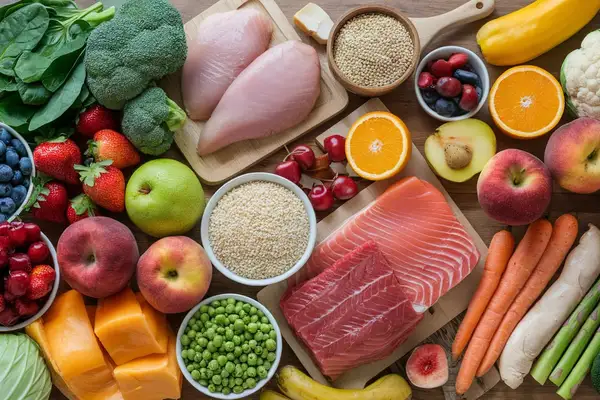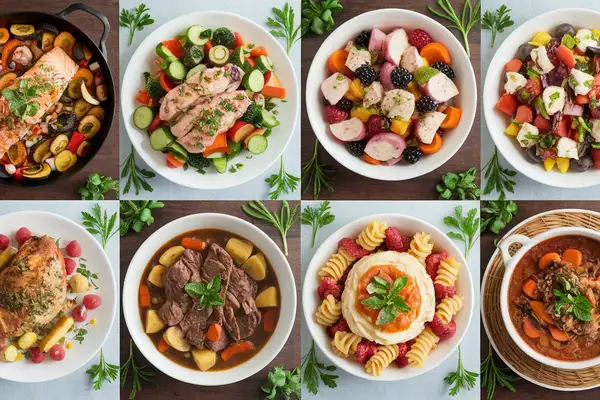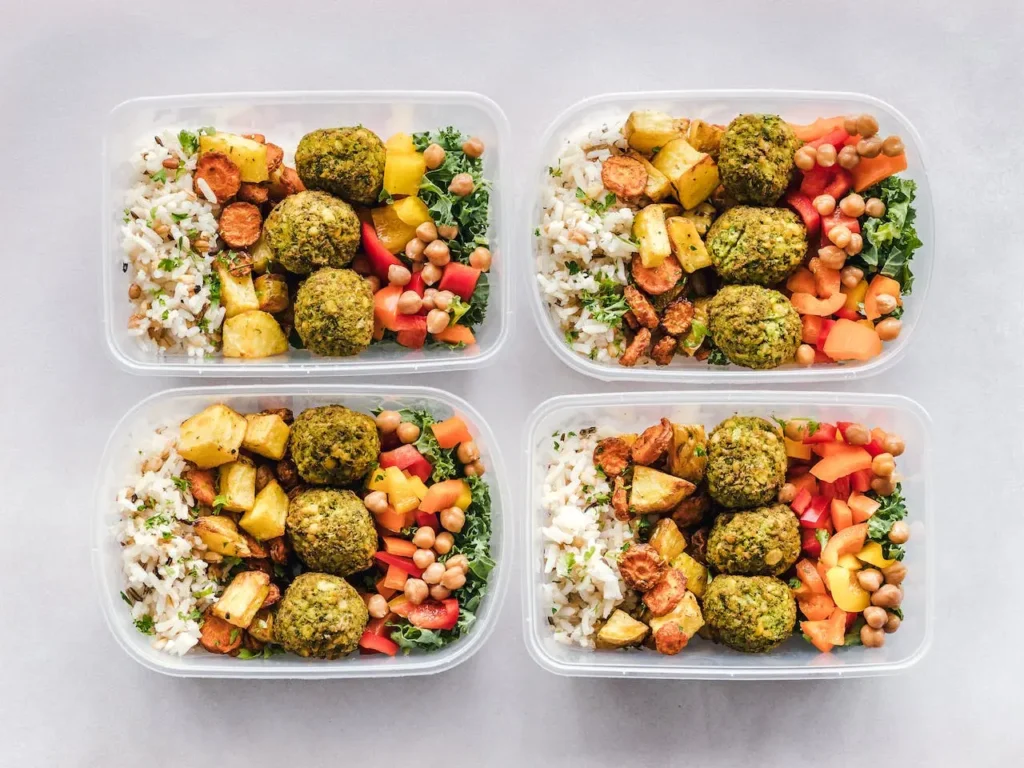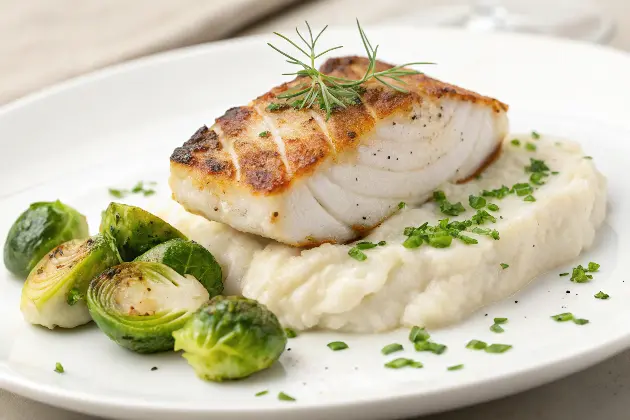7-Day High Protein Meal Plan For Weight Loss
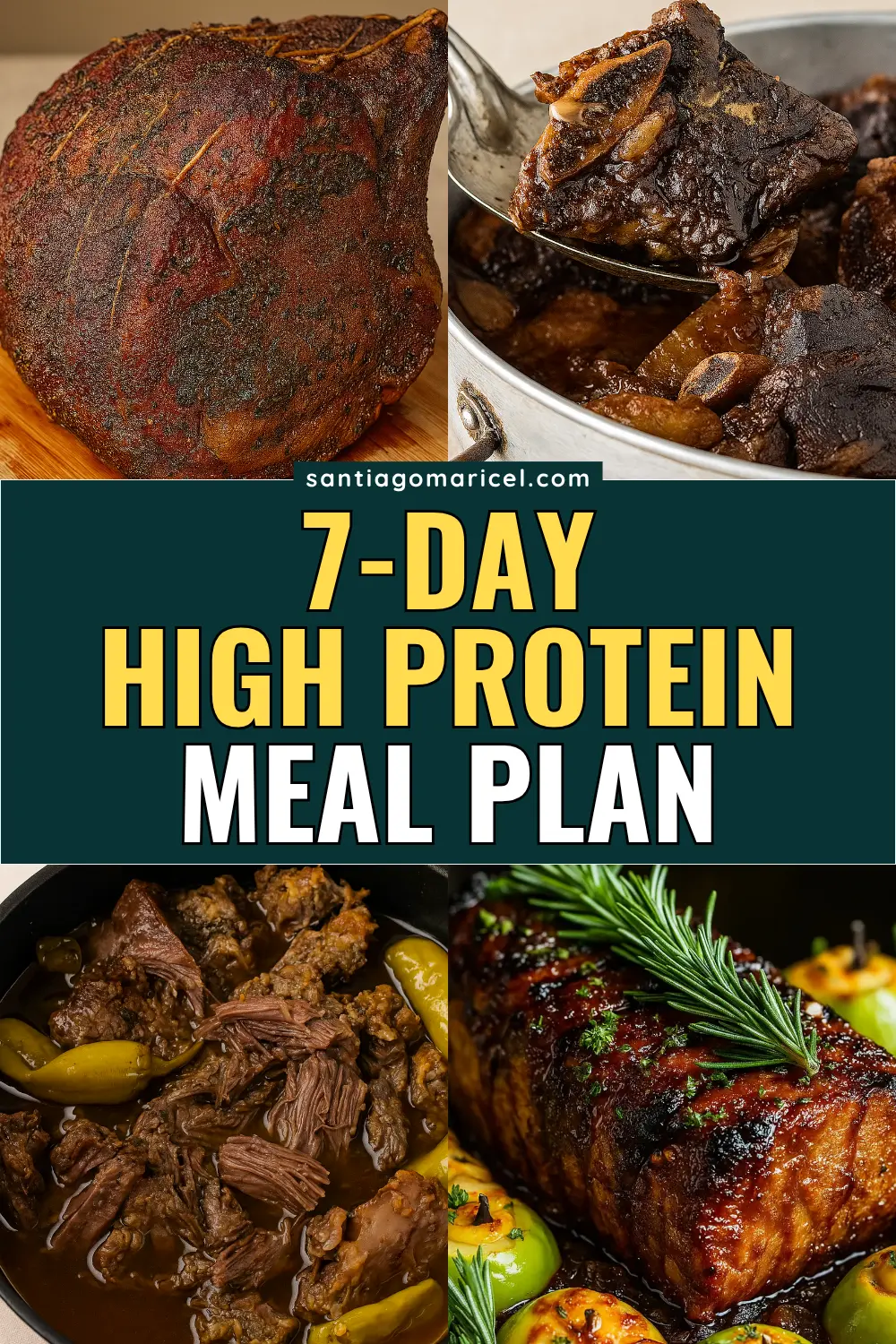
This post may contain affiliate links, meaning I may earn a commission if you make a purchase, at no extra cost to you. I only recommend products I trust. Thank you for your support.
A high protein diet is basically an eating pattern that focuses on getting a larger portion of your daily calories from high protein foods like lean meats, fish, eggs, Greek yogurt, tofu, and beans.
The idea of this high protein meal plan is to increase protein intake while keeping carbs and fats at balanced or slightly lower levels.
People follow high protein diets because protein helps you stay full longer, stabilizes blood sugar, supports muscle repair, and boosts metabolism, making it especially popular for weight loss and body recomposition.
There’s no single “rule,” but most high protein diets aim for about 25 to 35% of daily calories from protein, or roughly 0.7 to1 gram of protein per pound of body weight, depending on goals.
This high protein meal plan features a full week of easy high protein low carb meals designed to boost metabolism, control hunger, and support steady weight loss.
Whether your goal is fat loss, muscle definition, or healthier eating habits, this 7-day high protein meal plan gives you structure, balance, and delicious variety.
Principles of a High Protein Diet for Weight Loss
A high protein diet for weight loss focuses on increasing your protein intake while keeping calories and carbohydrates in a balanced, controlled range.
These principles help maximize fat loss while protecting lean muscle and keeping hunger in check.
1. Prioritize Lean, High-Quality Protein Sources
Choose proteins like chicken breast, turkey, fish, eggs, Greek yogurt, tofu, and legumes to boost nutrition without unnecessary calories or saturated fats.
2. Include Protein in Every Meal and Snack
Spreading protein throughout the day helps stabilize blood sugar, curb cravings, and maintain steady energy.
3. Pair Protein with High Fiber Vegetables
Vegetables add volume, slow digestion, and enhance fullness, making each meal more satisfying without adding many calories.
4. Limit Refined Carbs and Added Sugars
Keeping carbs lower helps improve appetite control and encourages the body to use stored fat for energy.
5. Choose Healthy Fats in Moderation
Avocado, nuts, olive oil, and fatty fish provide satisfaction and flavor while supporting hormone balance and nutrient absorption.
6. Stay Hydrated Throughout the Day
Adequate water supports digestion, appetite regulation, and proper muscle function when protein intake is high.
7. Maintain Sustainable Calorie Deficit
Protein helps you feel full on fewer calories, but overall intake still matters. A moderate, sustainable calorie deficit is key for long-term fat loss.
8. Balance Protein Intake with Movement
Strength training or even light resistance exercises help preserve and build lean muscle, amplifying the benefits of a high protein diet.
Healthy 7-Day High Protein Meal Plan for Weight Loss
This high protein meal plan features a full week of satisfying, high protein low carb meals designed to boost metabolism, control hunger, and support steady weight loss.
Each day includes lean proteins and high fiber vegetables that keep calories in check while keeping you feeling full and energized.
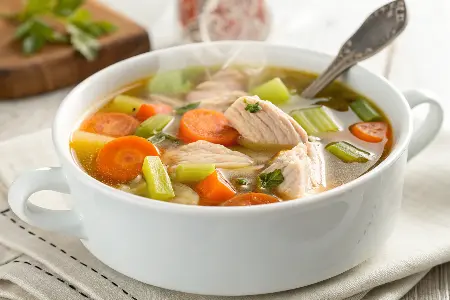
Day 1
Breakfast:
- Roasted Red Pepper Egg Scramble: A fluffy protein-rich scramble made with eggs, sautéed fajita vegetables, and roasted red peppers, finished with a light red pepper sauce.
Lunch:
- Chicken and Vegetable Bone Broth Soup: Shredded chicken simmered in rich bone broth with carrots, celery, spinach, and herbs for a comforting, high protein weight loss soup.
Dinner:
- Tuscan Inspired Chicken: Lean baked chicken breast in a creamy sun-dried tomato and garlic sauce served with steamed broccoli and baby carrots for a fiber-boosted, low-carb dinner.
Snacks:
- Pick-Me-Up Nut & Seed Mix: A handful of mixed nuts and seeds offering healthy fats and plant-based protein for steady energy.
- Dark Chocolate Peanut Butter Bites: Sugar-free dark chocolate filled with natural peanut butter for a sweet, high-protein bite.
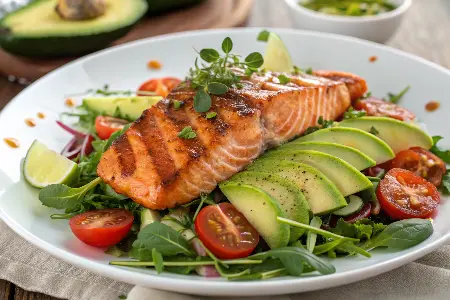
Day 2
Breakfast:
- Spinach Mushroom Egg White Omelet: A fluffy omelet packed with sautéed mushrooms, spinach, and egg whites for a light but protein-dense start to the day.
Lunch:
- Grilled Salmon Salad with Avocado: Lemon-pepper grilled salmon served over romaine, cucumber, tomatoes, and red onion with creamy avocado and a drizzle of herbed olive oil dressing.
Dinner:
- Turkey Zucchini Skillet: Lean ground turkey simmered with sliced zucchini, onions, and paprika, creating a hearty one-pan low-carb dinner high in protein and flavor.
Snacks:
- Cottage Cheese with Chia: Creamy cottage cheese topped with a small sprinkle of chia seeds for extra protein and fiber.
- Turkey Roll-Ups: Slices of deli turkey rolled with cucumber sticks for a crisp, low-carb protein snack.
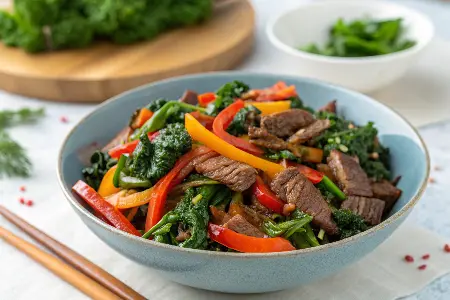
Day 3
Breakfast:
- High-Protein Chia Yogurt Pot: Greek yogurt mixed with chia seeds, topped with a few raspberries for light sweetness and added fiber.
Lunch:
- Garlic Butter Shrimp Bowl: Pan-seared shrimp in garlic butter served over a warm bed of sautéed spinach for a satisfying, carb-conscious lunch.
Dinner:
- Beef and Kale Stir-Fry: Lean beef strips quickly stir-fried with kale, garlic, and ginger in a light soy glaze for nutrient-dense, high protein low carb meals.
Snacks:
- Hard-Boiled Eggs: Two seasoned boiled eggs for a clean and convenient protein boost.
- Almond Protein Bites: Low-carb almond flour balls mixed with vanilla protein powder and pressed into bite-size snacks.

Day 4
Breakfast:
- Smoked Salmon & Avocado Plate: Slices of smoked salmon paired with avocado, lemon, and cracked pepper for a fresh, protein-rich breakfast without carbs.
Lunch:
- Chicken Caesar Salad (Low-Carb): Grilled chicken breast served over romaine lettuce with shaved parmesan and a light Caesar dressing, no croutons for a low-carb meal.
Dinner:
- Slow-Cooker Chicken with Pumpkin: Slow-cooked chicken simmered with pumpkin, onions, garlic, and warm spices until the pumpkin forms a naturally creamy, low-carb sauce coating the tender chicken.
Snacks:
- Edamame Cup: Steamed edamame sprinkled with sea salt for plant-based protein.
- Pepperoni & Cheese Bites: A few slices of beef pepperoni paired with mozzarella for a savory low-carb snack.
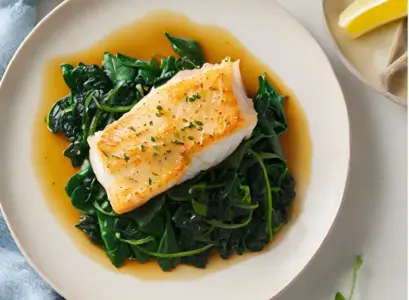
Day 5
Breakfast:
- Turkey Sausage & Veggie Scramble: Lean turkey sausage sautéed with peppers and onions, folded into a fluffy egg scramble for a hearty low carb breakfast.
Lunch:
- Baked Cod with Spinach: Mild, flaky cod baked with lemon and garlic and served over sautéed spinach for simple, lean, high protein low carb meals.
Dinner:
- Grilled Chicken with Cauliflower Mash: Juicy grilled chicken breast served over buttery cauliflower mash with a side of sautéed zucchini for a comforting low carb dinner.
Snacks:
- Celery with Whipped Cottage Cheese: Crisp celery sticks dipped in whipped cottage cheese for a cooling, high-protein snack.
- Walnut Protein Clusters: Lightly sweetened sugar-free walnut clusters enriched with protein powder.

Day 6
Breakfast:
- Egg Muffins with Turkey & Spinach: Oven-baked egg muffins filled with chopped turkey breast and fresh spinach for a portable high protein breakfast.
Lunch:
- Beef Taco Salad (Low-Carb): Seasoned lean ground beef served over lettuce with tomatoes, avocado, and a dollop of Greek yogurt, no tortilla, all protein.
Dinner:
- Stuffed Chicken Breasts and Tabbouleh Salad: Juicy chicken breasts stuffed with spinach and feta and baked until tender, paired with a bright low-carb tabbouleh made from parsley, tomatoes, cucumber, and lemon-olive oil dressing.
Snacks:
- Pistachio Portion Pack: A small handful of pistachios for healthy fats and plant-based protein.
- Sugar-Free Gelatin with Greek Yogurt: A mix of sugar-free gelatin cubes with a spoon of Greek yogurt for a light, high-protein sweet snack.
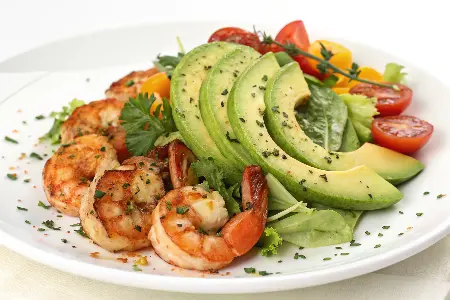
Day 7
Breakfast:
- Cottage Cheese Omelet Roll: A thin omelet rolled with cottage cheese and chives for a high-protein, low-carb morning meal.
Lunch:
- Grilled Shrimp and Avocado Salad: Grilled seasoned shrimp served over crisp greens with tomatoes, cucumber, red onion, and creamy avocado, finished with a light citrus-olive oil dressing.
Dinner:
- Turkey Meatballs with Zucchini Noodles: Oven-baked lean turkey meatballs served over sautéed zucchini noodles in a light garlic herb sauce.
Snacks:
- Beef Jerky (Low-Sodium): A few strips of clean, high-protein jerky for easy snacking.
- Avocado Egg Boats: Halved avocados filled with egg salad for a rich protein-and-fat combo.
Best High Protein Foods for Weight Loss
Choosing the right protein sources can boost metabolism, reduce cravings, and make healthy eating feel effortless and satisfying.
Below are the best high protein foods to help you plan smarter meals and meet your goals.
1. Lean Meats
- Chicken breast
- Turkey breast
- Lean ground turkey
- Lean ground beef (90–96%)
- Beef sirloin
- Pork tenderloin
- Bison
- Venison
2. Seafood & Fish
- Salmon
- Tuna (fresh or canned)
- Cod
- Halibut
- Tilapia
- Mackerel
- Sardines
- Shrimp
- Scallops
- Mussels
- Trout
3. Eggs
- Whole eggs
- Egg whites
- Egg bites
- Boiled eggs
4. Dairy
- Greek yogurt (unsweetened)
- Skyr
- Cottage cheese
- Ricotta (low-fat)
- String cheese / mozzarella
- Protein milk (ultra-filtered milk)
5. Plant-Based Proteins
- Tofu
- Tempeh
- Edamame
- Lentils
- Chickpeas
- Black beans
- Kidney beans
- Split peas
- Seitan
- Soy yogurt (unsweetened)
6. High Protein Nuts & Seeds
- Almonds
- Pistachios
- Peanuts
- Walnuts
- Pumpkin seeds
- Sunflower seeds
- Flaxseeds
- Chia seeds
- Hemp seeds
- Mixed nuts & seed blends
7. Protein Powders & Supplements
- Whey protein isolate
- Casein protein
- Egg white protein
- Soy protein
- Pea protein
- Brown rice protein
- Mixed plant protein blends
8. High Protein Vegetables
- Spinach
- Broccoli
- Brussels sprouts
- Kale
- Asparagus
- Green peas
- Collard greens
- Artichokes
9. High Protein Snacks
- Beef jerky (low-sodium)
- Protein bars (low sugar)
- Hard boiled eggs
- Turkey roll-ups
- Greek yogurt cups
- Cottage cheese cups
- Tuna packets
- Edamame cups
- Almond protein bites
Benefits of a High Protein Diet
A high protein diet offers a wide range of benefits that make weight loss easier, more sustainable, and healthier.
- Increased Satiety and Reduced Cravings: Protein takes longer to digest than carbs or fats, helping you stay fuller for longer and reducing the urge to snack or overeat.
- Supports Lean Muscle Maintenance: When losing weight, protecting lean muscle is crucial. Protein provides the amino acids your body needs to maintain and repair muscle tissue.
- Boosts Metabolism: Digesting protein requires more energy than digesting fats or carbs, a phenomenon called the thermic effect of food, leading to a slightly higher calorie burn throughout the day.
- Stabilizes Blood Sugar Levels: Protein slows the absorption of glucose, helping prevent blood sugar spikes and crashes that can trigger hunger and cravings.
- Enhances Body Composition: Higher protein intake combined with resistance training can help reduce body fat while improving muscle tone and definition.
- Supports Better Digestion and Recovery: Protein helps repair cells, tissues, and muscles, supporting faster recovery after workouts and daily physical activity.
- Helps Control Appetite Naturally: High protein meals stimulate satiety hormones, making it easier to maintain a calorie deficit without feeling deprived.
- Promotes Long-Term Weight Management: By improving fullness, metabolic rate, and muscle retention, a high protein diet helps keep lost weight off more effectively than low-protein approaches.
Resources
- High protein meals for weight loss
- A high-protein diet for reducing body fat
- The benefits of a high protein low-carb diet
Final Remarks
A high protein diet is more than just a trend; it’s a powerful tool for supporting weight loss, preserving lean muscle, and keeping you full and satisfied throughout the day.
By choosing nutrient-dense, high protein foods and pairing them with high fiber vegetables and healthy fats, you can create meals that are both flavorful and effective for fat loss.
This 7-day high protein meal plan offers a diverse mix of easy high protein meals and snacks, ensuring you never feel deprived while staying on track with your goals.
Combine these high protein meals with regular physical activity, proper hydration, and mindful eating habits to maximize results.
Personalize the plan to fit your taste preferences and lifestyle, and you’ll find that losing weight while enjoying your meals becomes not only achievable but sustainable.
- Delicous and unique Christmas dinner ideas
- 30-day carnivore diet for weight loss
- Low sodium meal plan
- Foods to avoid with trulicity
- What foods to avoid if alkaline phosphatase is high
- 1600 high protein calorie diet for weight loss
- 7-day bone broth diet for weight loss
- South beach diet for weight loss
- Alpine ice hack for weight loss
- Elimination diet meal plan
- 7-day meal plan for pregnant women
- The menopause diet 5-day plan to lose weight
- Intermittent fasting meal plan for beginners
- 7-day Daniel fast meal plan
- Foods to help with endometriosis pain
Frequently Asked Questions (FAQs)
What is a high protein diet?
A high protein diet emphasizes foods rich in protein, such as lean meats, fish, eggs, dairy, legumes, and nuts, to support muscle maintenance, satiety, and weight loss.
How much protein should I eat for weight loss?
For weight loss, aim for 1.2 to 2.2 grams of protein per kilogram of body weight per day, depending on your activity level and goals.
Can a high protein diet help burn fat?
Yes, protein boosts metabolism, preserves lean muscle, and helps you feel fuller, which can reduce calorie intake and promote fat loss.
Are eggs good for a high protein diet?
Absolutely, eggs are an excellent source of complete protein, low in calories, and provide essential nutrients like choline and vitamin B12.
Which high protein foods are best for weight loss?
Lean meats, poultry, fish, eggs, low-fat dairy, tofu, tempeh, legumes, and protein powders are all excellent options to support fat loss and muscle preservation.
Can I combine a high protein diet with intermittent fasting?
Yes, pairing high protein meals with intermittent fasting can help maintain muscle, reduce cravings, and improve fat loss results.
Can I get enough protein on a vegetarian diet?
Yes, vegetarians can meet protein needs through eggs, dairy, legumes, tofu, tempeh, seitan, nuts, and seeds, ensuring a balanced high protein vegetarian diet.
